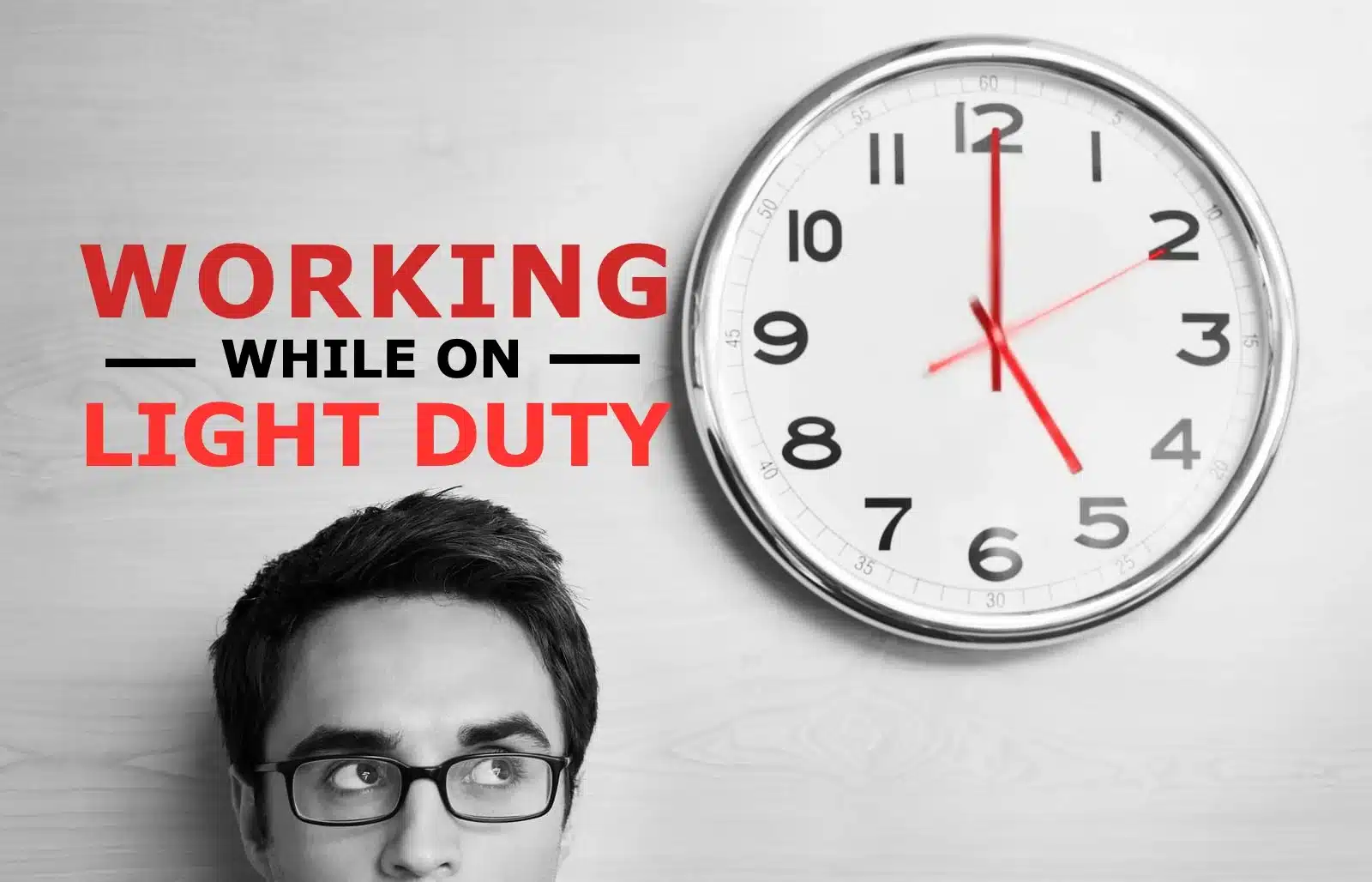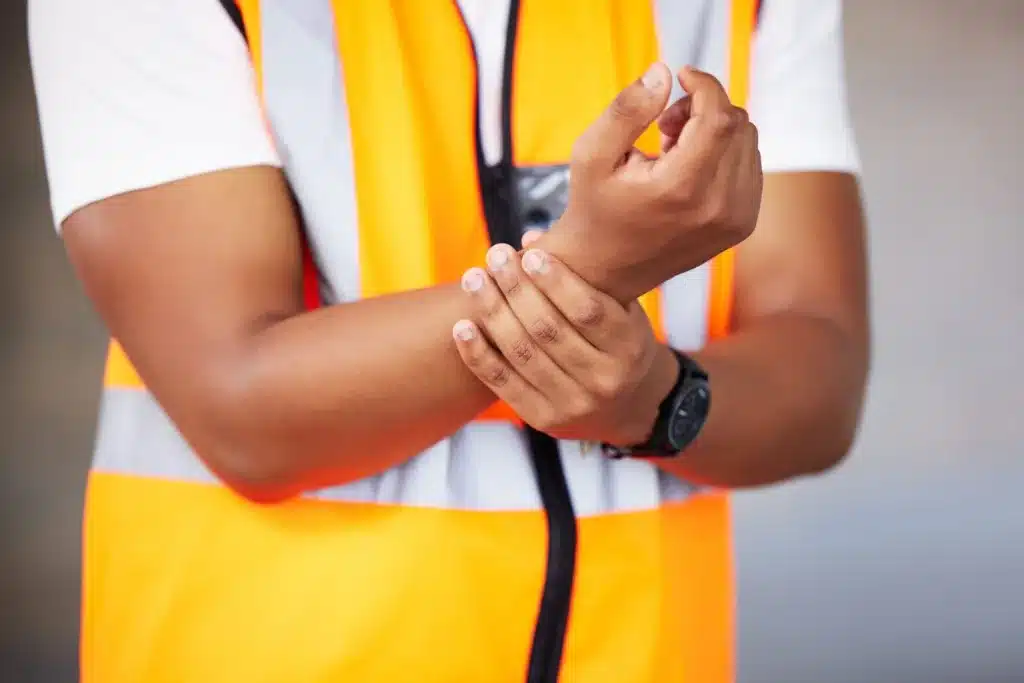How Many Hours Can You Legally Work While on Light Duty?
If you’ve been injured on the job and are receiving workers’ compensation benefits, you may have been offered a light duty position as part of your return-to-work plan. But there can be some confusion over how many hours are permitted under a light duty plan.
The answer depends on your medical restrictions, your employer’s accommodations, and the workers’ compensation laws in your state. RTRLAW is here to explain the light duty work plan and help you protect your rights during your recovery.
What Is “Light Duty” Work?
When you’re recovering from a workplace injury, returning to your regular job may not be possible right away. That’s where light duty work comes in. Light duty provides a path back to employment while respecting your medical limitations. Understanding what qualifies as light duty and how it should be structured is crucial to protecting your health and your workers’ comp claim.
Light duty refers to temporary or modified job tasks that accommodate your work-related injury. This might include:
- Reducing your physical workload (e.g., no lifting or standing)
- Shortened work hours or fewer days per week
- Administrative or sedentary roles instead of physical labor
- Reassigned tasks that avoid aggravating your injury
Your doctor will determine your restrictions based on your condition, and your employer must comply with these restrictions when assigning duties.
Knowing how many hours you can work within these restrictions is the next critical step.
How Many Hours Can You Legally Work on Light Duty?
Once you’ve been cleared for light duty, the number of hours you’re allowed to work isn’t set by law, it’s determined by your doctor’s recommendations. The key is staying within your stated medical restrictions to avoid further injury and protect your workers’ compensation benefits.
Some example scenarios include:
- If your physician says you can only work 4 hours per day, then working more may violate your medical orders and jeopardize your recovery.
- If you’re medically cleared for full-time light duty, your employer may assign you 40 hours per week as long as the work remains within your limitations.
The workers’ comp system allows light duty work as a transitional step to help you stay productive and earn wages while recovering. However, pushing beyond your restrictions could hurt your claim or lead to re-injury.
Understanding how these hours affect your workers’ compensation benefits is important as well.
How Does Light Duty Affect Your Workers’ Comp Benefits?
When you’re on light duty and not earning as much as you did before the injury, you may qualify for partial wage replacement through workers’ compensation. These benefits are designed to help bridge the income gap while you recover.
In Florida:
- Workers may receive up to 80% of the difference between pre-injury and post-injury earnings.
- Your benefit amount will be calculated based on your Average Weekly Wage (AWW) before the injury.
To explain this in another way, if you earned $900 per week before your injury but now earn $500 per week on light duty. You may be entitled to partial wage replacement on the $400 difference.
This partial compensation can provide important financial relief during your recovery, but only if your employer is honoring your work restrictions.
What Happens if Your Employer Violates Light Duty Restrictions?
In some unfortunate cases, employers may pressure injured workers to take on tasks or hours that exceed their medical restrictions. This not only jeopardizes your health but can also put your workers’ comp benefits at risk.
If you feel you’re being forced to engage it:
- Longer hours than recommended
- Tasks that go beyond your doctor’s restrictions
- Unsafe conditions that could worsen your injury
…you have the right to get help. Contact your doctor and a workers’ comp attorney immediately to safeguard your health and your claim.
But what happens if you’re offered light duty that feels unfair or unnecessary?
Can You Refuse Light Duty Work?
If your employer offers a legitimate light duty position that complies with your doctor’s restrictions and you refuse it without a valid reason, your workers’ comp benefits could be reduced or terminated.
However, if:
- The job exceeds your physical limitations
- The tasks are demeaning or retaliatory
- The hours are inconsistent with your medical release
…you may have grounds to refuse. Always speak with your doctor and an attorney before declining light duty work.
If you’re unsure whether your assigned work is appropriate, it’s important to act quickly. The next section outlines exactly what you can do to ensure you are in compliance.
What Should You Do If You’re Being Asked to Work Too Much?
If you believe your employer is assigning too many hours or duties that violate your medical restrictions, here’s what you should do:
- Notify your physician: Document your symptoms and request an updated work status.
- Speak to your employer in writing: Ask for duties to be adjusted according to your restrictions.
- Document everything: Keep track of your hours, tasks, and any conversations.
- Call RTRLAW: We’ll help protect your rights and ensure you’re not being exploited.
These steps will help ensure your recovery stays on track and your workers’ comp benefits are not jeopardized. When challenges arise, having legal support makes all the difference.
How RTRLAW Can Help Injured Workers
When you’re recovering from a workplace injury, the last thing you need is added stress from an employer who doesn’t respect your limitations. At RTRLAW, our experienced workers’ compensation attorneys are here to make sure your rights, and your recovery, are protected every step of the way.
RTRLAW will:
- Review your work restrictions and employment situation
- Ensure you’re not working excessive hours or performing prohibited tasks
- Fight for your continued medical treatment and wage benefits
- Handle communication with your employer and insurance carrier
We understand the physical and emotional toll a workplace injury can take. If you’re concerned about your light duty hours or workers’ comp benefits, don’t wait. Call 1-833-HIRE-RTR for a free consultation today. With offices throughout Florida, we’re here to help you get back on your feet, safely and securely.


 CALL US NOW
CALL US NOW TEXT US NOW
TEXT US NOW



























